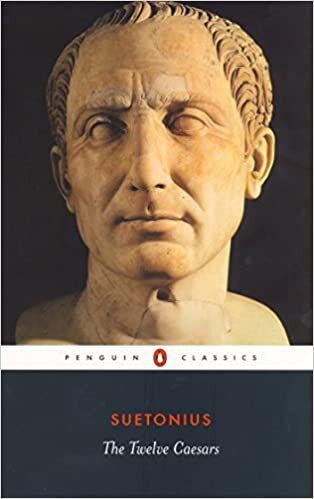Well Read Wednesday: The Twelve Caesars
Something a bit different this time, but since I read as much non-fiction work as I do fiction I thought it time that was represented here. How did I come to be reading Suetonius's Twelve Caesars just now? The book is a famous Roman text originally called De Vita Caesarum—translated as The Life of the Caesars, although a more common English title is The Lives of the Twelve Caesars or simply The Twelve Caesars and it was probably written during the reign of the Emperor Hadrian by the historian and biographer Gaius Suetonius Tranquillus. Although I've known of the text for many years I must admit that I was swayed by the notoriety of the work and dismissed it as so much Roman Imperial 'Fake News'. I was wrong.
 Whilst watching a recent re-run of Alistair Sook's BBC series The Treasures of Ancient Rome I was surprised to see him clutching a copy of this book as he guided us through said treasures and even referring directly to it in positive terms. Since I am currently doing some background research into the latter part of the first century AD I decided to swallow my pride and ordered a copy. The two Emperors I was most interested in were Vespasian and Titus so that's where I started. Still concerned about the integrity of 'Suet's' accounts I appealed to a higher authority and asked Professor Mary Beard who I am lucky to count as a friend. Indeed Mary happened to be writing a piece on Seutonius for the TLS and she enlightened me by describing it an analysis of dynasty and succession rather than a collection of the individual biographies for Julius Caesar, Augustus, Tiberius, Caligula, Claudius, Nero, Galba, Otho, Vitellius, Vespasian, Titus and Domitian. I dutifully took a deep breath and went back to the beginning but I am glad that I did. Mine is the Penguin Classics copy of the popular Robert Graves translation, revised and annotated by the American James Rives. The introductory material is well worth reading in order to establish a context for what follows.
Whilst watching a recent re-run of Alistair Sook's BBC series The Treasures of Ancient Rome I was surprised to see him clutching a copy of this book as he guided us through said treasures and even referring directly to it in positive terms. Since I am currently doing some background research into the latter part of the first century AD I decided to swallow my pride and ordered a copy. The two Emperors I was most interested in were Vespasian and Titus so that's where I started. Still concerned about the integrity of 'Suet's' accounts I appealed to a higher authority and asked Professor Mary Beard who I am lucky to count as a friend. Indeed Mary happened to be writing a piece on Seutonius for the TLS and she enlightened me by describing it an analysis of dynasty and succession rather than a collection of the individual biographies for Julius Caesar, Augustus, Tiberius, Caligula, Claudius, Nero, Galba, Otho, Vitellius, Vespasian, Titus and Domitian. I dutifully took a deep breath and went back to the beginning but I am glad that I did. Mine is the Penguin Classics copy of the popular Robert Graves translation, revised and annotated by the American James Rives. The introductory material is well worth reading in order to establish a context for what follows.
Through his friendship with Pliny the Younger, Seutonius came to the attention of, firstly, the Emperor Trajan, whom he served as secretary of studies and director of Imperial archives, then later under Hadrian, he became the Emperor's secretary. As such he had all the access needed to study in great detail the lives of his subjects. Yes, if you want scandal and headline fodder it is there in abundance. Suetonius was the first to publicly describe Julius Caesar's epilepsy. We are still shocked at the apparent debauchery of Tiberius having little boys in his pool nibbling at his genitals or the outrageous behaviour (madness?)of Caligula with his sisters etc. That aside Seutonius had no axe to grind and he appears to have been a very serious and thorough scholar.It is in the succession of each in turn that we find the real sadness and drama of the reign of the Caesars. The transition of power was never straight forward, often bloody and always more complex than we might imagine. I get the feeling that life at the top was mostly short, often lonely and always viewed over the shoulder. I have been left with a feeling of considerable sadness for most of the twelve principle characters but a far better understanding of each of them as men. If, like me you were put off by the bad press of the past, but you have any interest in this period of history I urge you to give the book a whirl.As a footnote, The Twelve Caesars posed a question relevant to the contemporary arguments about imperialism and statues. Our visual knowledge of the ancient Romans relies heavily on statues, particularly on the thousands of marble busts which have survived. The men were in their own time the very worst of empire builders and en-slavers of 'foreigners'. Should we consign them to the vaults or even to the hammer for that? Maybe history has something to teach us after all?